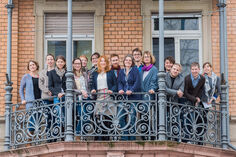Research
Research
The work of the Center for Psychotherapy Research (FOST) aims to improve the understanding, prevention and treatment of mental illness. The FOST's research program focuses on various areas of psychotherapy and care research. The current work can be primarily assigned to the following main areas:
Digital interventions and e-mental health
The FOST has been working on the development and evaluation of Internet-based and mobile interventions ("e-mental health") since 2001. These interventions have been developed in numerous projects for various mental illnesses, such as depression, eating disorders, dermatillomania, self-harm, schizophrenia, and personality and trauma disorders. These interventions are used in different areas of the care spectrum such as health promotion and self-help, primary and secondary prevention, but also in treatment preparation, therapy, relapse prevention and chronic disease management. The evaluation studies of the FOST are focused on examining the effectiveness, efficacy and cost-effectiveness of digital interventions. In addition, different implementation and dissemination strategies are examined and interventions are evaluated in terms of their reach and public health impact.
Contact: PD Dr. Stephanie Bauer
(stephanie.bauer(at)med.uni-heidelberg.de)
Help-seeking and barriers to care
The fact that only a minority of affected individuals (promptly) seek professional help contributes significantly to the enormous burden of disease associated with mental illness at the population level. From the perspective of health services research, reducing this so-called "treatment gap" by improving access to evidence-based prevention and therapy is of crucial importance. The work of the FOST therefore focuses on increasing the reach of professional services (e.g., through digital interventions) and on estimating the public health impact of different health care strategies in the context of simulation studies. In addition, we investigate both specific barriers that contribute to the lack of professional help for affected persons and factors that contribute to delayed utilization, reduced adherence and dropout. In the context of experimental and interventional studies, we also investigate the effectiveness of innovative approaches to improve help-seeking behavior and reduce barriers to care.
Contact: PD Dr. Stephanie Bauer
(stephanie.bauer(at)med.uni-heidelberg.de)
Psycholinguistic analyses
Language is the central medium for communication and interaction with others. Psycholinguistic analyses of speech in spoken or written form can therefore provide valuable insights into psychological intra- and interindividual processes. In the context of psychotherapy research, such analyses are used, among other things, in the evaluation of transcripts of psychotherapy sessions or of written components of therapy-accompanying services with. Research on communication on the Internet and especially in social media can also take advantage of psycholinguistic analyses used in since most of the communication is in written form and the texts are saved over time. FOST’s research in this area focuses on online communities or forums in social media related to mental disorders. In analyzing intra- and interindividual processes, both top-down and bottom-up approaches are employed to identify language styles and relevant topics. Methods such as the Linguistic Inquiry and Word Count dictionary system and Topic Modeling with Latent Dirichlet Allocation are used.
Contact: PD Dr. Markus Moessner
(markus.moessner(at)med.uni-heidelberg.de)
Network analyses
USE OF NETWORK ANALYSIS FOR THE ANALYSIS OF INTERACTION PATTERNS
In the context of ICT-based interventions, user data are stored in databases in a standardized form and can thus be used directly for further analyses. Psychotherapeutic group sessions in Internet chat rooms allow an investigation of relevant process variables and particularly beneficial interaction patterns. The analysis of complex interaction patterns requires methods that are able to describe the processes in their complexity. Modern network analysis can be used to model such complex interaction patterns, including personal variables. Network analysis is used for identification and modeling of patterns in the relationships represented by the interaction data of the communication partners. In a representation as network nodes and edges, these can be formally characterized in their entirety. Individuals are represented as nodes and the relationships between nodes as edges. Local network structures around individuals can be represented, which can be related to property characteristics (e.g., diagnoses, psychological stress, etc.), thereby opening up new possibilities for operationalizing concepts to capture specific group therapy processes.
Contact: PD Dr. Markus Moessner
(markus.moessner(at)med.uni-heidelberg.de)
Quality assurance
QUALITY MANAGEMENT IN PSYCHOTHERAPY
Since the early 1990s, the FOST has provided scientific support for the implementation of quality management (QM) programs for psychosomatic and psychotherapeutic treatments. The main focus lies on the development of a learning and communication culture in the clinic team in order to actively work on achieving a clinically significant treatment outcome for as many patients as possible.
The Stuttgart-Heidelberg Model focuses on outcome quality, but also takes into account relevant data on structural and process quality. All assessments are made from both the subjective perspective of the patient and the professional perspective of the therapist. Patients' satisfaction with their treatment receives special attention.
The QM includes standardized psychological admission and discharge diagnostics as well as detailed documentation of the therapeutic measures applied. The inventory answers the central questions of every QM (Who comes for treatment? With what therapeutic methods and to what extent is treatment provided? Which result is achieved?). The KPD-38 is used for continuous observation of the course of recovery. This procedure has been standardized, normed and validated by the FOST. It records not only the physical and mental condition and social impairment but also the psychosocial resources of the patient.
Since pure data collection does not guarantee quality, the Stuttgart-Heidelberger model comprises the following five steps:
- Information collection
- Actual-to-target comparison using standardized assessment algorithms: Each development is evaluated as good or "conspicuous".
- Feedback of the results to the therapeutic team
- Communication and planning of treatment in internal quality circles
- Cross-case evaluations and quality reports
Since 2003, the FOST has used Internet-based software for data collection, processing and feedback. This enables regular evaluation and feedback of the individual health status during therapy without time delay. Further advantages of internet-based QM are:
- Flexibility of the questionnaire inventory and survey schedules
- Data quality: automatic check for completeness and plausibility
- Reminder function: entry lists and entry reminders can be sent by e-mail
- Feedback: immediate automatic evaluation and feedback
- Security: password-protected access for different user groups, encrypted data transfer, documentation of all data entries and data changes
- User-friendliness: no additional software installations necessary
- Cost savings: no additional costs due to time-consuming data entries and data evaluations
Contact: PD Dr. Markus Moessner
(markus.moessner(at)med.uni-heidelberg.de)
Instruments
Software ASMO
The software ASMO ("Assessment and Monitoring of Mental Health") allows flexible and user-defined online data collection via smartphone, tablet, or PC. Possible applications include psychotherapy process and outcome research, longitudinal monitoring of mental health and disease, and Ecological Momentary Assessment (EMA) within and outside of therapeutic settings. The software allows the implementation of different study designs and the corresponding surveys (e.g. RCTs, EMA studies, observational studies, experimental studies).
Additional modules also allow the integration of internet-based and mobile interventions (eHealth/mHealth) for the prevention and treatment of mental illness. In addition, a module for quality assurance in psychotherapy is available. This module allows to collect process and outcome parameters efficiently and to report relevant information back to therapeutic teams in real time.
Our server infrastructure and expertise in software development allows us to flexibly adapt ASMO to specific requirements in research projects and different care contexts as well as to the needs of our clinical cooperation partners.
Contact: Maximilian Wilhelm
(maximilian.wilhelm(at)med.uni-heidelberg.de)
For more information on our research activities, please contact us.



